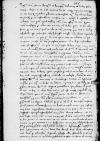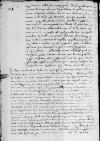Letter #1588
[Ioannes DANTISCUS] to [Georg von BAYSEN (BAŻYŃSKI)]Löbau (Lubawa), 1537-03-12
English register: Dantiscus is replying to three letters from Bażyński. The tense atmosphere at the royal court makes it impossible for Dantiscus to attend to the matters that Bażyński entrusted to him in Cracow; they will have to wait for better times. The place and time of the upcoming assembly depend on Maurycy Ferber’s decision; his poor health will probably not allow him to participate in the assembly, unless it is held in Malbork. During Dantiscus’ stay in Cracow, the Płock bishop (Jan Chojeński) proposed Toruń as the venue for the assembly, for the convenience of the royal commissioners. If, however, Ferber decides to come to Malbork, it would be best not to have the sessions elsewhere, as Ferber’s absence means less strength in the voting. If Ferber is unable to come, he will send two Warmia canons in his place. Dantiscus will let Bażyński know as soon as a decision is reached. Dantiscus complains about the financial and moral losses he has sustained in connection with his being at the Diet in Cracow, and about the rebuke given him by his friend (Maurycy Ferber) for complaining. Dantiscus asks Bażyński to reprimand parish priest Ioannes (Staer), who – leaving the parish – has been taking or selling movable property belonging to the parish without the bishop’s knowledge. News of the Turkish threat has been coming from Hungary and the Austrian borderland.
Manuscript sources:
Prints:
| ||||||||||||||
Text & apparatus & commentary Plain text Text & commentary Text & apparatus Excerpts concerning Dantiscus' travels
Magnifice Domine, Amice carissime et honoran(de) or honoran(dissime)⌈honoran(de)honoran(de) or honoran(dissime)⌉. Salutem et omnem felicitatem.
Accepi a Magnificentia Vestra
Ea, quae Magnificentia Vestra scripsit de loco et tempore
Velim conqueri ut amico, verum, ne mihi accidat ut paulo ante ab amico[3], vereor, cui cum graves a me duobus iam annis sese subsequentibus expensas pro patria factas nihil petens vel sperans descripsissem, responsum fuit Germanico adagio: “Was dw kanst das thw”[4]. Adversarii mei dicunt, quod  BCz, 244, p. 206
atque inimicis nullam sum nactus gratiam.
cf. Cic. Sul. (30) 31 difficile est enim tacere, cum doleas ⌊Durum quidem est tacere (quod
BCz, 244, p. 206
atque inimicis nullam sum nactus gratiam.
cf. Cic. Sul. (30) 31 difficile est enim tacere, cum doleas ⌊Durum quidem est tacere (quod
ms 1 Plomcio,
ms 2 3 Plonitio,
ms 4 Plautio⌈Plancio(!)Plancio,
ms 1 Plomcio,
ms 2 3 Plonitio,
ms 4 Plautio⌉
), cum doleascf. Cic. Sul. (30) 31 difficile est enim tacere, cum doleas ⌋[5]. Si quid in eo pecco, ms 2 3 4 utique,
ms 1 u[tique] paper damaged⌈utiquems 2 3 4 utique,
ms 1 u[tique] paper damaged⌉ venia indignus non sum. Hoc tamen cum damno meo sum in hoc itinere, et tot taediis, quae devoravi, assecutus, quod postea futurus ms 2 3 4 sum,
ms 1 s[um] paper damaged⌈summs 2 3 4 sum,
ms 1 s[um] paper damaged⌉ cautior, neque adeo facile mihi sinam persuaderi in
posterum, ut ms 2 3 4 cum,
ms 1 cu[m] paper damaged⌈cumms 2 3 4 cum,
ms 1 cu[m] paper damaged⌉ meo incommodo parum gratis sim commodo etc.
Fuit 1537-03-11⌊heri1537-03-11⌋ apud ms 2 3 4 me,
ms 1 [me] paper damaged⌈mems 2 3 4 me,
ms 1 [me] paper damaged⌉
ms 1 reliq[ua] paper damaged⌈reliquams 2 3 4 reliqua,
ms 1 reliq[ua] paper damaged⌉ sunt, venditione extenuat et expilat, quod quidem sine episcopi scientia, cuius est debitum modum in iis praescribere, fieri non deberet. Idque igitur scribo, quo commoneatur, ne quid in ea transmigratione praeter ms 2 3 4 phas,
ms 2 pha[s] paper damaged⌈phasms 2 3 4 phas,
ms 2 pha[s] paper damaged⌉ et aequum faciat. De rebus novis nihil est, quod scribam ad praesens, praeter atroces minas, quae de
ms 1 n[obis] paper damaged⌈nobisms 2 3 4 nobis,
ms 1 n[obis] paper damaged⌉ quam diutissime sospitem et incolumem conservet, tantorum malorum ms 2 4 auctores,
ms 1 auctores,
ms 3 auctorem⌈auctoresms 2 4 auctores,
ms 1 auctores,
ms 3 auctorem⌉ castigabit.
Ex

